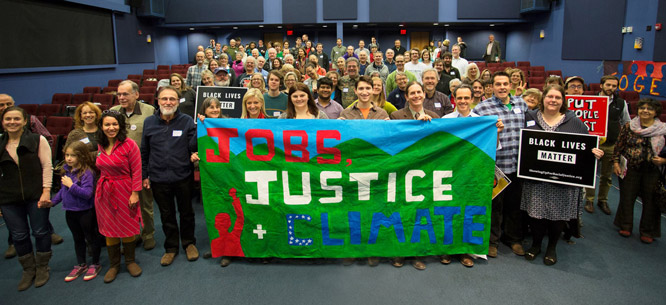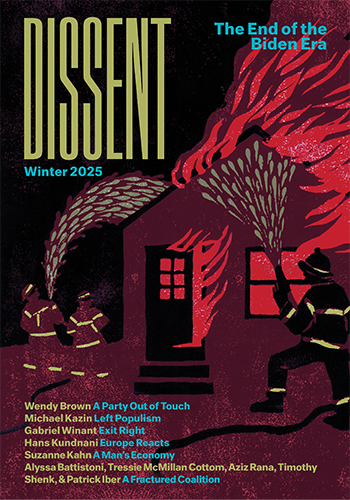The Seeds of Rural Progressivism
The Seeds of Rural Progressivism
Many rural communities feel a contempt for the status quo that persists regardless of the ruling party. Organizers are helping them build their own political power, in service of their own needs.

[contentblock id=subscribe-ad]
“Most of us are one step away from disaster,” says Kathleen Oliver, a semi-retired social welfare professional who lives in the small town of Marlborough, New Hampshire. At seventy-four, Oliver stopped working full-time some years back, but with only her monthly Social Security check to get by on and various family members to take care of, she was coming up short. She sold her house, then picked up a couple of part-time jobs. “I can see how the elderly become depressed,” Kathleen acknowledges, though she does not share the same feeling of resignation. “I probably won’t be among the depressed. I’ll be among the pissed off.”
Nearly 20 percent of people in the United States live in communities classified as rural. In whatever region of the country they find themselves—New England or the Midwest, the Deep South or the Mountain West—they tend to share Oliver’s sense that disaster is knocking at their door. Many continue to suffer the aftereffects of the Great Recession, which followed decades of economic decline in rural America. And many, like Kathleen, are pissed off.
As organizers with extensive experience working in these kinds of communities, we often confront a familiar set of challenges when trying to build grassroots organizations that can sustain a progressive movement in rural America: change takes time, and that means resources to fund staff and the kind of community organizing that unpacks decades of trauma, alienation, and anger and turns that energy into solutions that are empowering and equitable. Much more than bastions of Trump-loving conservatism, rural communities are home to people who feel a contempt for the status quo that transcends the results of national elections and persists regardless of the party in power.
That reality comes with its own difficulties. But it also presents opportunities. When Rights & Democracy (RAD) New Hampshire conducted a survey with nearly 1,000 Granite Staters in 2018—some of whom had voted for Barack Obama in 2012, and some of whom had voted for Donald Trump in 2016—the results we found were telling. (Full disclosure: we are both staffers at RAD.) Regardless of political preference, there was broad agreement among our respondents about the most pressing needs confronting the region. Roughly 80 percent of those we spoke with identified the major problems facing their communities as the lack of access to affordable healthcare, the overdose crisis, poor schools, low-paying jobs, and land and water pollution. They also agreed on solutions: making healthcare affordable for everyone, creating good-paying jobs through government investment and much-needed infrastructure and environmental clean-up projects, and spending more on struggling public schools. Survey respondents were more split on issues of race and immigration. But, significantly, in a state that is 94 percent white, they tended not to blame immigrants and people of color for their problems. When asked why they voted the way they did, many Trump voters claimed they did not particularly like him but felt he represented change, while Hillary Clinton just seemed like “more of the same.”
In parts of rural Indiana, New Hampshire, and Vermont, grassroots organizations—some of which are part of larger national organizing networks such as People’s Action and the Center for Popular Democracy, both of which RAD belongs to—are reexamining how to take on the slow, deliberate work of helping rural residents build local power and transform their communities along progressive populist lines. All of them start from the premise that the sense of disengagement many rural Americans feel is not a permanent condition. In the three years since they began organizing, these groups are already winning important victories—from passing local laws establishing paid sick days for all to expanding Medicaid and electing movement leaders to office. Their successes are a model for progressives everywhere—not only of what is possible, but of the kind of movement-building work it will take to get there.
Perhaps the biggest challenge rural organizers face today is the sense that rural America is no longer as important to the economy and the national political conversation as it once was. Rural America is no longer spoken of as the country’s “breadbasket” or even its “coal bin”—as a source of raw materials or processed goods critical to the national economy. At the same time as the perceived value of rural areas has diminished (except as tourist or recreation destinations), economic stagnation in rural communities has deepened, due to both population loss and a lack of decent-paying jobs. Across the country, more than 1,300 non-metro counties have lost population since 2010—a result, in part, of a rate of job growth that is less than one-third of the urban rate. And with each passing year, more and more of the rural jobs that remain are clustered in the poorly compensated service sector. Since 2001, the number of manufacturing jobs in rural areas has declined by more than 20 percent, even as total rural employment grew by 7 percent.
National politicians occasionally gesture to these issues; they are certainly happy to shake hands at rural diners for photographers during election season. But concrete plans for addressing economic decline in rural areas have been few and far between. “Young people just don’t have many opportunities here,” explains Dylan Carney of Dover, New Hampshire, a small town tucked between New Hampshire’s mountains and seacoast that is struggling to maintain its manufacturing sector and relies ever more heavily on tourism. Current economic conditions often demand that workers be exceptionally mobile, willing to go wherever jobs can be found. But a politics guided by this sort of economic calculus devalues communities that are not profitable and punishes people, like Carney, who stay behind. “When I made the decision to take on a mountain of student debt, I was alone,” Carney says. “Most of my friends were too worried about what it meant for the future. But now none of it matters because even the ones who did get a degree are working two or three jobs.”
These conditions are inevitably alienating, and rural Americans experience this kind of alienation more acutely than most. That’s why groups like RAD are building their bases through relational organizing and distributed models of leadership. This approach gives decision-making control to local members rather than professional staff—on everything from how these organizations define their priorities to what kind of activities they engage in to mobilize their fellow community members.
Despite the common misconception that rural communities are at best doggedly apathetic and at worst staunchly conservative, RAD and other similar groups, like Northeast Kingdom Organizing in Vermont and Hoosier Action in Indiana, have found that this bottom-up model of organization building has helped to overcome a prevailing sense of political disillusionment in many parts of rural America. All three groups have developed energetic regionally based and member-led chapters, which have grown steadily in recent years. And all three have successfully rallied rural community members behind a range of progressive initiatives—from affordable healthcare and accessible public transportation to campaigns for racial and environmental justice—that the conventional wisdom suggests are nonstarters outside of the urban centers home to most progressive movement activity.
Founded in Vermont in 2015, RAD has committed itself to avoiding the trap of dropping into a community, running a quick campaign, extracting some stories or money or a leader or two, and then leaving. Instead, RAD’s focus has been on building lasting power within communities—not by saturating them with outside organizers, but by developing the capacity of rural residents to run for office or otherwise effect change where they live. RAD has grown quickly and expanded into New Hampshire in late 2016.
Key to RAD’s early success has been its focus on issues that enjoy widespread local support. In 2016 RAD’s Vermont members knocked on more than 10,000 doors as part of a campaign in support of paid sick leave legislation—helping to make Vermont just the sixth state in the country to pass such a law. More recently, RAD members made hundreds of phone calls to legislators in support of a bill that would establish a $15 state minimum wage and a paid family leave act that would expand benefits for more than 50,000 Vermonters. After both bills passed only to be vetoed by Vermont’s Republican governor, Phil Scott, RAD members turned to the work of putting a veto-proof supermajority in the state legislature. They helped to recruit, train, and elect more than a dozen candidates across the state during the 2018 midterms, all of whom publicly pledged support for the group’s “People’s Platform” in order to receive the group’s endorsement.
The local emphasis that RAD brings to its work is shared by Northeast Kingdom Organizing (NEKO), which operates across the rural, three-county region in northeast Vermont that accounts for more than 20 percent of the state’s land mass but is home to only 10 percent of its population. After a year-long series of house parties and community meetings attended by hundreds of residents from the sparsely settled area, NEKO members gathered in a church basement in Barton, Vermont, in January 2018 for a locally unprecedented “issues assembly.” They identified the lack of accessible and affordable public transportation (a common problem in rural settings around the country) as one of the key challenges to community well-being and began strategizing about what to do about it. A series of “community listening sessions” organized by NEKO members followed—including one, held in a child-care center in Newport in early 2019, that gave local residents the opportunity to articulate their needs directly to the coordinator of the regional public transit agency.
It may not have been a splashy election victory—and it took years of organizing to pull off—but community actions like the Newport meeting are perfect examples of NEKO’s approach to local movement building. Rarely do residents of the Northeast Kingdom have the opportunity to engage with or confront official representatives who occupy positions of power. The long-term implications of these moments can be profound. “Northeast Kingdom Organizing will never be a political organization, but participation in NEKO can be a pathway to political action for people who have been alienated from the process,” explains Colleen Moore de Ortiz, a public health nurse and founding member of NEKO who lives in Newport with her four children.
Nearly a thousand miles away, in the southern tip of Indiana along the Ohio River, Kate Hess Pace has drawn similar conclusions from her work with Hoosier Action, a rural community organization she started in New Albany, where her great grandmother once ran a bar and raised seven children. The rolling hills make for a beautiful landscape in this part of the state, but with around 15 percent of the region’s population living in poverty, the economic realities are decidedly bleaker. Hess Pace launched Hoosier Action in 2016 because of what she saw as a lack of political infrastructure geared toward the needs of rural residents in the area. “At least the Republicans pay lip service to small-town America,” Hess Pace notes. “The Democrats largely do not and have left a general sentiment that no one is fighting for small towns.”
Hoosier Action set out to fill the void. Since 2017 the organization has knocked on the doors of over 20,000 rural residents across southern Indiana, trained hundreds of member-volunteers, and built member-led chapters in several nearby counties. Like RAD and NEKO in northern New England, Hoosier Action has found the greatest success by focusing on the day-to-day issues that affect people most directly in their local communities, like fighting to preserve clean air and water and making Medicaid more accessible for local residents.
The stakes of this work feel particularly high to Hess Pace. Indiana was the “canary in the coal mine,” as she puts it, for the recent right-wing campaigns to roll back social welfare provisions across the Rust Belt while the Democratic Party’s traditional base of support among working-class families eroded. In 2011 Indiana became the first state in the region to fall under unified Republican control of the state legislature and governorship and was a testing ground for Vice President (and former Indiana Governor) Mike Pence’s far-right agenda to privatize roads, healthcare, and other public goods. “The last ten years have been devastating for our politics,” Hess Pace says. “Using the pain and anguish of institutional collapse, the financial crisis, and corporate abandonment, an extreme right wing has emerged to consolidate power into a trifecta supermajority in our state legislature.”
And yet for all that has been discouraging about Indiana politics recently, there are reasons for hope as well. White nationalism found a foothold in southern Indiana after the 2016 election, especially around Paoli, a town of 3,500 located two hours south of Indianapolis that is the birthplace and home base of Traditionalist Worker Party (TWP) founder Michael Heimbach. But Paolians proved themselves formidable opponents of the TWP’s toxic racism. After Heimbach and his followers drew national attention for posting roadside signs calling for the creation of a white ethno-state on the road into Paoli, a group of residents—mostly women—organized their neighbors to fight this message of hate. They posted their own signs around town offering a counter-message of inclusivity. They even persuaded the town council to adopt a resolution that disavowed the intolerance of the TWP.
The events in Paoli may seem small, but they were significant. Beating back the TWP’s racist and anti-immigrant rhetoric united the local community around a set of common values, which in turn became the starting point for a locally generated community action with tangible political effects. It also challenged the widespread misperceptions about Rust Belt residents’ inherent racism. Hess Pace attributes the success of progressive campaigns like this one, in the “red-state” heart of rural Indiana, to a few simple principles: start with local issues, build on existing relationships within the community, and trust women to get the job done.
Mari Cordes found that the same kinds of lessons apply in comparatively “blue” Vermont. Cordes, a registered nurse and former president of the nurses’ union at the state’s largest hospital (as well as a founding RAD member), lives in a rural legislative district that had sent a Republican, Fred Baser, to the Vermont House of Representatives for the last twenty years. When Cordes decided to run against Baser in 2018, she was able to draw on relationships she had built in the community as a neighbor, nurse, and union leader over nearly as long a period. Bringing a grassroots approach to electoral campaigning—in part by inviting community members to come together and talk about the changes they wanted to see in the district and state during regular listening sessions she organized throughout the campaign—Cordes ended up outpolling Baser by nearly 100 votes. Wasting no time, Cordes spent her first term in office co-sponsoring legislation to raise the minimum wage, eliminate the lower minimum wage for tipped workers, enact paid family leave, expand investments in weatherization programs for low-income people, and provide a constitutional right to abortion in Vermont.
Successful community organizing unfolds across a longer timeline than a single legislative session or electoral campaign cycle. It is also resource-intensive. And yet philanthropic foundations and major donors—the sources of much material support for this type of work—often insist that community organizations achieve concrete policy goals during the lifespan of a grant. They often fail to account for the prerequisite but less glamorous work of restoring or creating community capacity to engage in social and political change. Not surprisingly, funders have shown comparatively less interest in rural organizing; rural counties get less than half the amount of grant funding per capita that suburban and urban counties receive. Without a significant shift in how resources are allocated at the upper levels of the movement left, and without innovation by grassroots organizations themselves in how they design their funding models—for example, through community-level, small-dollar membership dues, or by tapping into local pools of potential donors—we may not be able to build a progressive populist base in rural America fast enough to avert the crises posed by global climate change and deepening social and economic inequity.
And yet, as the experiences of groups like RAD, NEKO, and Hoosier Action make clear, there are reasons to be optimistic. “The results will not be seen or felt for some time,” notes NEKO’s Colleen Moore de Ortiz, about the grassroots organizing she and her fellow rural Vermont residents are doing. But already they are planning for “the long game.” “The seeds sowed in human connection, by telling our stories and listening to the stories of others,” she said, “could culminate in the creation of the new world.” At the very least, they will help lay the groundwork for a progressive movement for change across rural America—change that is built on a new social contract that advances equitable, community-led solutions that advance human rights and democracy for everyone.
Kate Logan, director of programming and policy at Rights & Democracy, is a feminist social and political theory scholar, specializing in family policy, participatory democracy, and human rights. She has a background in labor and community organizing and nonprofit management.
Shay Totten is a former journalist who has written about environmental, economic, and social justice issues and is currently the communications director at Rights & Democracy Vermont.




